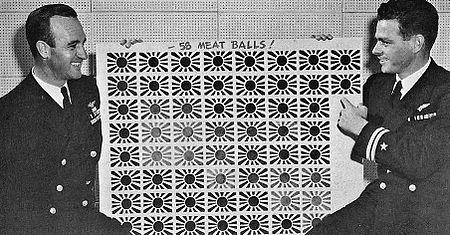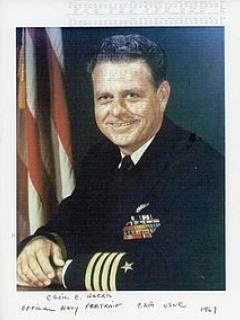HARRIS-CECIL
CECIL ELWOOD "CECE" HARRIS

CAPT

WWII SECOND HIGHEST FIGHTER ACE - 24 KILLS
Cecil Elwood Harris was born in Faulkton, South Dakota, on December 2, 1916. He attended Northern State Teachers College in 1934-35 and 1939-41, and prior to entering the Naval service, he taught school in Onaka, South Dakota. On March 26, 1941, while in college, he enlisted in the Naval Reserve and completed preliminary flight course there. On August 20, 1941, he was appointed an Aviation Cadet and upon completion of flight training was commissioned an ensign on March 12, 1942, having earned his wings as a naval aviator.
As a member of Escort Fighter Squadron Twenty-Seven aboard escort carrier USS SUWANEE, he participated in the North African invasion following which he was with the squadron at Guadalcanal in early 1943. During 1944 he next served with Fighter Squadron Eighteen on the carrier USS Intrepid. During these assignments, in a time span of only six weeks, Harris was credited with shooting down 24 Japanese planes making him the second leading ace of the war. Remarkably, he scored 16 of his aerial victories in four different days, downing four enemy aircraft on each of those days. Even more remarkable, during his 88-day tour with VF-18 not a single enemy bullet hit his aircraft.
It has been said that Harris “was arguably the most consistently exceptional fighter pilot in the Navy. Though he was only a lieutenant at the time, many of VF-18’s green pilots turned to Harris for advice and the squadron commanding officer similarly recognized Harris’s ability and made him the flight operations officer. Advancing progressively in rank he remained in the Naval Reserve until retiring in June 1967 with the rank of Captain after 27-years in the Navy. When recalled to active duty during the Korean Conflict, Harris was employed as principal and teacher at Cresbard High School in South Dakota.
CAPT Cecil Elwood Harris died December 2, 1981, in Groveton, Virginia, and is buried at Arlington National Cemetery. He was survived by his wife and a daughter.
NAVY CROSS CITATION
The President of the United States of America takes pleasure in presenting the Navy Cross to Lieutenant Cecil Elwood Harris (NSN: 0-114286), United States Naval Reserve, for extraordinary heroism in operations against the enemy while serving as Pilot of a carrier-based Navy Fighter Plane in Fighting Squadron EIGHTEEN (VF-18), attached to the USS INTREPID (CV-11), in action against enemy Japanese forces on Luzon, Philippine Islands, on 29 October 1944. Quick to intercept two successive flights of Japanese fighter planes preparing to attack our bomber and torpedo squadrons as they completed a strike on Clark Field, Lieutenant Harris boldly led his Division in a swift assault on the enemy planes. Skillfully and daringly maneuvering among the hostile formations, he shot down one enemy plane from each flight and put the others to rout. Quick to intercept a superior force of enemy fighters descending in waves in furious attempts to wipe out our fighter protection, he dauntlessly engaged in the fierce dog fight which ensued. Successively knocking down two enemy planes closing on two of our Hellcats whose pilots were unaware of their imminent peril, he effectively averted the certain destruction of these friendly planes and assisted essentially in the utter defeat of the entire enemy formation without the loss of any of our planes from enemy action. By his courageous initiative, superb airmanship and fearless devotion to the fulfillment of a hazardous mission, Lieutenant Harris contributed materially to the success of our operations in this strategic area, and his personal valor in the face of grave peril upheld the highest traditions of the United States Naval Service.

LT David McCampbell and LT Cecil Harris, with 34 and 24 aerial victories respectively, pose with their collective 58 “meatballs.” (1945)
Submitted by CDR Roy A. Mosteller, USNR (Ret)

